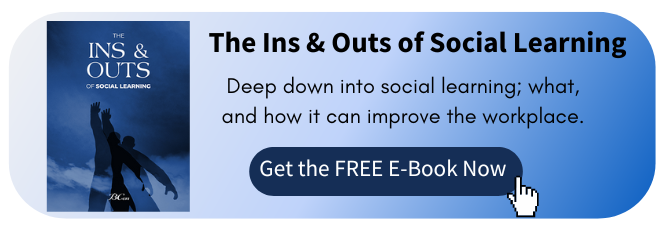Understanding Social Learning
Since the spread of technology-enabled learning, the significance of "Social Learning" in the workplace has increased by double. An office worker's day includes plenty of time for socializing with peers and coworkers. Many workers routinely connect with peers or observe superiors to learn the ropes of the Workplace.
In addition, social learning creates a vital element of involvement because group members are not just passive information consumers (compared to a learner receiving information through a long Skype presentation). For people to learn more efficiently, their behavior, environment, and cognition must all interact and impact one another. Therefore, social learning helps learners improve their soft skills, such as communicating with one another. Social learning enables learners to understand each other inexplicitly. In addition, engaging with one another improves other soft skills such as problem-solving, critical thinking, decision making and much more as learners engage and share thoughts and experiences through various platforms. 2
And even though informal learning and information flow will continue to thrive in a digital format for social interactions and learning, social learning is still possible over a learning management system. For many businesses, embracing social learning has become essential.
Understanding Social Learning
Before we dive deeply into Social Learning, let's define it.
Based on the Cognitive Theory of Learning, social learning is a learning and development concept. People learn by either accepting or rejecting the observed behavior of others in a social situation. Additionally, Operant Conditioning, which is the presentation of equal amounts of rewards and punishments, allows people to continue learning and growing.3
Social Learning theory studies learned behaviors through observing, modeling, and imitating new behaviors that other people, or "models", reinforce. New behaviors persist or stop depending on how they are rewarded or reinforced in the social environment. Albert Bandura, a psychologist, and the author of this hypothesis, conducted an experiment that examined his idea of modeling and observational learning, which would later be developed into the social learning theory.4
Bandura attempted to demonstrate that human conduct is acquired by modeling or watching others, and that these observations can direct activities and lead to mimicked behaviors in subjects later on. He did this by exposing groups of children aged three to six to aggressive behavior. He was able to prove his theory with success. In the study, youngsters did become more violent after witnessing aggressive conduct in adults.
Three fundamental ideas are present in the Social Learning Theory:
1. People can learn through observation.
2. This learning process heavily depends on people's mental states, in other words, whether they are motivated or not.
3. A change in behavior does not always follow when something is learned, which means, when we learn something or observe it, we do not necessarily learn doing, or behave, it.
1Enyota Learning, 5 Nov 2020, The Importance of Social Learning in the Workplace, Accessed 30 Nov 2022, https://enyotalearning.com/blog/importance-social-learning-theory-workplace/
2Instancy, Harvey Singh, Social Learning theory: What is it&its importance in workplace training, Accessed 8 Jan 2023,https://www.instancy.com/social-learning-theory/#:~:text=Adopting%20social%20learning%20in%20the,being%20and%20boost%20team%20morale
3 Enyota Learning, 5 Nov 2020, The Importance of Social Learning in the Workplace, Accessed 30 Nov 2022,https://enyotalearning.com/blog/importance-social-learning-theory-workplace/
4Social Work License Map, Accessed 30 Nov 2022, https://socialworklicensemap.com/social-work-resources/social-learning-theory-and-its-importance-to-social-work/#:~:text=Social%20learning%20theory%20is%20the,rewarded%20in%20the%20social%20environment.
For more about this topic, download our latest book " The Ins & Outs of Social Learning" for FREE:
